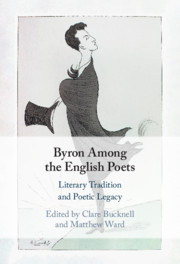Book contents
- Byron Among the English Poets
- Byron Among the English Poets
- Copyright page
- Dedication
- Contents
- Contributors
- Acknowledgements
- Abbreviations
- Introduction
- Part I Inheritances
- Chapter 1 Byron and Shakespeare
- Chapter 2 Not for Envy: Paradise Lost and the Inward Turn in Byron’s Cain
- Chapter 3 Byron and Rochester
- Chapter 4 Byron’s ‘Popifying’: Twice-Told Tales
- Chapter 5 ‘Liquid Lines’: Byron Among the Amatory Poets
- Chapter 6 Byron and Satire post-1760
- Chapter 7 Byron’s English Verse Inheritance
- Part II Contemporaries
- Part III Afterlives
- Index
Chapter 2 - Not for Envy: Paradise Lost and the Inward Turn in Byron’s Cain
from Part I - Inheritances
Published online by Cambridge University Press: 22 July 2021
- Byron Among the English Poets
- Byron Among the English Poets
- Copyright page
- Dedication
- Contents
- Contributors
- Acknowledgements
- Abbreviations
- Introduction
- Part I Inheritances
- Chapter 1 Byron and Shakespeare
- Chapter 2 Not for Envy: Paradise Lost and the Inward Turn in Byron’s Cain
- Chapter 3 Byron and Rochester
- Chapter 4 Byron’s ‘Popifying’: Twice-Told Tales
- Chapter 5 ‘Liquid Lines’: Byron Among the Amatory Poets
- Chapter 6 Byron and Satire post-1760
- Chapter 7 Byron’s English Verse Inheritance
- Part II Contemporaries
- Part III Afterlives
- Index
Summary
Critical appraisals of Milton’s influence on Romantic poets tend to centre on two aspects: first, the idea that they took their cue from Milton’s archangel Michael in Book 12 of Paradise Lost who advises Adam to seek a ‘paradise within’, conventionally interpreted as signifying the compensatory ‘inward light’ of imagination;1 second, that they fought the political or ethical corner of Milton’s Satan, developing ‘an elaborate exegesis of his human qualities and reactions’, a view we see most famously in Southey’s reference to Byron, Shelley and Hunt as a ‘Satanic School’.2 Byron’s Cain (1821), his most extended fictional engagement with Paradise Lost, has usually been viewed in this light and was castigated for it by contemporary reviewers. Many noted that Byron allowed Lucifer to develop arguments ‘without refutation’ – quite unlike Milton, whose Satan is checked at every turn by the warning voice of God and a chorus of archangels – thus undervaluing the alternative perspectives and dramatic significance of Byron’s other mortal characters, particularly Abel and Cain’s wife, whom he named Adah.3 Byron never attempted an imaginative recalibration of Milton’s epic, in the manner of Blake in his prophetic books or Wordsworth in The Prelude, and Truman Guy Steffan rightly notes that when Byron’s ‘Lucifer encouraged Cain to use his reason and judgment in determining right and wrong, he was far from Blake’s position’.4
- Type
- Chapter
- Information
- Byron Among the English PoetsLiterary Tradition and Poetic Legacy, pp. 35 - 50Publisher: Cambridge University PressPrint publication year: 2021

